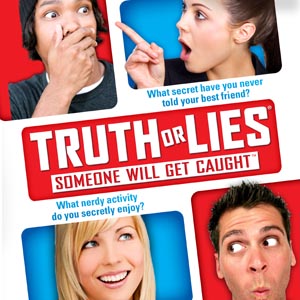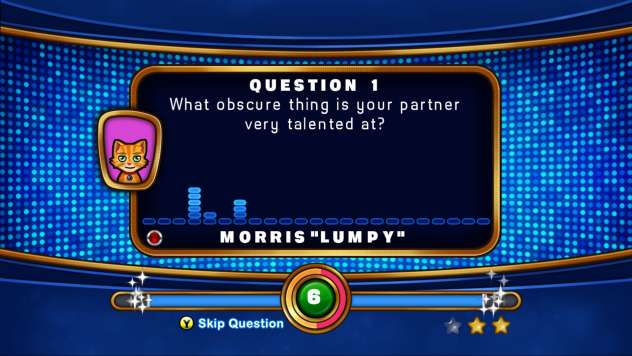
Released in time for the Christmas party season Truth or Lies aims to entertain, embarrass and bring laughter to families, friends and couples with a clever blend of tricky questions and advanced lie detection technology. Sadly, the only embarrassment and laughter to be had will be aimed at whoever forked out to buy the game in the first place.
The biggest problem is the very concept of the game. Almost everyone has played truth or dare at some point during their lives, a game which punishes you with a forfeit of varying degrees if you either blatantly lie or choose not to answer a probing question, and as you get older the questions tend to get even more awkward and the forfeits even more dramatic. But it’s still not a game you’d want to play all night every night.
So what happens if you take away the forfeits, take away the awkward questions and just have a game that asks you endless pointless questions without really knowing if you’re lying or not? You get Truth or Lies, that’s what.
After a mildly irritating introduction you get to set up a profile for each player and choose from a selection of 16 avatars, followed by the option (that’s right, it’s not compulsory) to calibrate the software by answering 3 questions truthfully and 3 with a lie. The fact it isn’t compulsory makes a lot of sense when you realise that calibrated or not, the game just doesn’t seem to know what’s going on. The host will also assign you a cheesy nickname to replace your own, just to make you feel that extra little bit more detached from the game. As for the host himself, imagine the least funny or likeable American voice-over guy you possibly can, then try and picture how annoying he’d be when hit repeatedly with the annoying stick. You’re getting close.
Once you get into a game you use a USB or wireless microphone to answer the questions one by one. Between each question the game tries to judge how truthful or dishonest you were, and assigns you points accordingly, with the very honest answers earning the highest marks. If you choose not to answer the question then you’re given a different one. Hardly a solid punishment. To aggravate you even further, you need to carry on speaking until the meter fills up to indicate the game has enough to judge you by. That much makes sense, but not when coupled with the questions that start with “In one word, describe…” – what was I meant to do? I ended up singing the word over and over again, and eventually got told it was a big fat lie. The narrator also does his absolute best to bore you between questions with some dialogue that can’t even be skipped. Do I really need to know another four rhymes about farting? No, I don’t because I’m not 6 years old. Shut up.
To the game’s credit, it does try to target the right sort of players, with categories for couples, families, adults, teenagers and kids. Hold on… kids? The game has a 12 certificate. Either Truth or Lies is trying hard to break its own PEGI rating or they have an entire category for 12 year olds, which seems unlikely.
But that doesn’t matter really, because a game should at the very least fulfil what it’s meant to do. A racing game wants you to feel like you’re driving fast, a fighting game should make you feel like you’re doing some damage, and a lie detector game should be able to tell if you’re lying or not. But Truth or Lies doesn’t. It hasn’t got a clue, in fact in a game between my wife and I we lied about every answer in a normal length game, that’s 18 question in total. The game told us that 13 of them were in fact the truth, so much so that my rank at the end of the game was “reliable” despite my plans for the week supposedly involving a trip to Jupiter, something the game deemed the most honest answer of the game.
At best, Truth or Lies will give your family or friends an hour of semi-entertainment before everyone twigs they can lie about whatever they like and have just as much chance as winning than telling the truth. At which point the dull questions and pointlessness of the whole thing will end up making way to a game of Pictionary or “stick the Christmas cracker novelty to the sleeping grandparent”. You might get a few laughs if you’re playing with people who don’t take it too seriously, and some of the questions might prompt some heated discussions or late night debate, but once you’ve turned it off for the first time it’s unlikely you’ll turn it back on much, if at all.



Leave a Reply